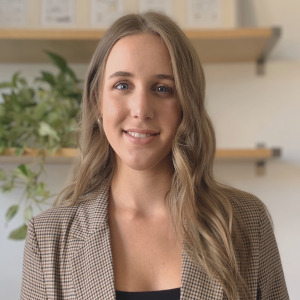Héloïse Rouleau
Undergraduate student in musicology

A get-together with Héloïse Rouleau, doctoral student in musicology at the Université de Montréal Faculty of Music.
- Tell us about yourself and your background.
I’m a cotutelle doctoral student in musicology at Université de Montréal and in history, art history and archeology at the Université de Liège. My research focuses on the meeting of sociology and musicology in relation to the hip-hop repertoire. I’m a conscientious and committed researcher, something that earned me the SSHRC Joseph-Armand-Bombardier Grant to continue my doctoral studies and, most recently, the SOCAN / MusCan Foundation Prize for Canadian Music Research.
I started playing the violin, then gave it up to study journalism. I quickly realized that what I loved was talking about music, but not just on the surface as is often the case in the media. So I finished my bachelor’s degree and I turned to musicology to do research on the musical subjects that most interest me.
On the good advice of Professor Marie-Hélène Benoit-Otis, I first made up for the delay in my musical education by signing up for a major in music, history and society. I then began my master's degree under the supervision of Michel Duchesneau. Combining my backgrounds in communication and music, I focused on the presence of the Québec rap community on the Internet following its marginalization by the industry in the early 2000s. My thesis will look at similar issues around the French-speaking rap community in Belgium.
- Why did you choose the Faculty of Music?
Initially, it was to deepen my knowledge of music without having to redo a bachelor’s degree. Afterwards it became more a question of the expertise and supervision that I’ve received from the teaching staff in musicology. It’s a very lively environment for research and creative research in music. I loved having the opportunity, from undergraduate studies onward, to get involved, learn and thrive in diverse and stimulating projects as a research assistant at the Observatoire interdisciplinaire de creation et de recherche en musique OICRM.
- Have you learned anything there that you previously never knew existed or didn’t see the point of?
I learned to organize and coordinate scientific studies, as well as a lot about the issues related to the professions of creators and performers in music thanks to my involvement in student life. And now I can also do atonal solfège!
- Are there people who have had key roles in your studies?
There are so many! There’s Michel Duchesneau for his confidence, his patience, his enthusiasm for all my projects and for his involvement in my training. There’s the OICRM, which financially supported my research; the members of the Laboratoire de recherche musique, histoire et société́ for listening, for advice, for time-outs, for laughter and for their encouragement. There’s Federico Lazzaro, who showed trust in me by hiring me as a research assistant; Irina Kirchberg for guidance and advice; Marie-Pierre Leduc for all the emotional support during my moments of great doubt...
There’s the faculty, who gave me confidence, librarians whose empathy and help were very much needed. There are also the Feminist Committee and the Musicology Circle for the production of several projects.
The most special encounter was certainly the one with Marie-Hélène Benoit-Otis, who welcomed me to her office in 2015 while I was in full existential crisis, who believed in my projects and who was able all along to direct my energies in the right direction. And I don't want to forget Véronique Lefebvre for her GREAT patience with me and all my administrative questions!
- Was there a particular unforgettable experience you had at the Faculty?
During the first year of my master’s, I participated in the École d’hiver internationale en médiation de la musique co-organized by the Faculty of Music, Sorbonne University and the Hautes Écoles de Musique of Lausanne and Geneva. I visited Switzerland and developed a whole music-research network there.
- What advice would you give to a first-year student?
Get in touch with the teachers to guide you through your curriculum and your choices! They’re the best people to steer us along our academic careers and provide us with the tools for carrying out our projects.
- Describe an ambitious (or completely wacky!) project you’ve worked on.
With DESS in music mediation graduates and master’s and doctoral students in musicology we’ve set up an NPO, Médiateurs et médiatrices de la musique du Québec, to work on the development and the professionalization of the discipline in Québec.
With the Feminist Committee we’re working on organizing a concert that will highlight women, people who identify as women, people of non-binary gender, and people of sexual and cultural diversity from the Faculty of Music as a means of promoting their artistic work.
- What are your inspirations?
The work that has most left its mark on my career is that of the sociologist Tricia Rose, who does advocacy research and who’s developed a theoretical framework essential to the study of hip-hop. The work of musicologist Karim Hammou on rap in France has also stimulated many of my avenues of research.
- What are your aspirations?
I’d like to teach and continue my research on rap, popular music, music in Québec and Belgium, as well as on the transformation of the musical vocation through the Internet. I hope to contribute to the recognition of hip-hop studies in academia, whether in dance, visual arts or music. I’d also like to help make more space for the words of people of color and especially black people in hip-hop studies (and more broadly in academia).
March 2021